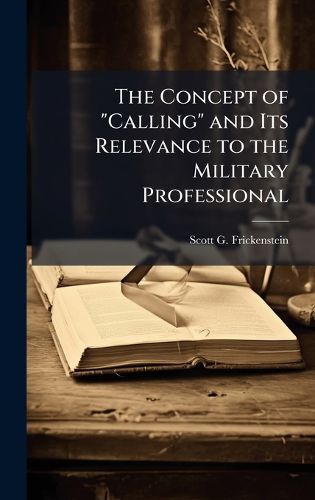Readings Newsletter
Become a Readings Member to make your shopping experience even easier.
Sign in or sign up for free!
You’re not far away from qualifying for FREE standard shipping within Australia
You’ve qualified for FREE standard shipping within Australia
The cart is loading…






Americans are vigorously seeking to understand their purpose in life: that is, to answer the question, "What on earth am I here for?" Theologians are using the concept of calling (also known as vocation) to provide answers to this question. Senior military leaders have recently used the word "calling" in various venues to describe the profession of arms. This study summarizes biblical teaching, historical foundations, and current research in explaining the concept of calling and its relevance to the military professional of the 21st century. The report first distinguishes between several terms often substituted for "calling" and summarizes the historical and current understanding of this concept. The process of discovering one's calling is then discussed. The uniqueness of the military calling is then described, and several personal and professional implications are offered. The study concludes that calling is much more than "being involved in something bigger than yourself" it is an all-encompassing perspective that can have profound, enriching effects on all facets of a military professional's life.
This work has been selected by scholars as being culturally important, and is part of the knowledge base of civilization as we know it. This work was reproduced from the original artifact, and remains as true to the original work as possible. Therefore, you will see the original copyright references, library stamps (as most of these works have been housed in our most important libraries around the world), and other notations in the work.
This work is in the public domain in the United States of America, and possibly other nations. Within the United States, you may freely copy and distribute this work, as no entity (individual or corporate) has a copyright on the body of the work.
As a reproduction of a historical artifact, this work may contain missing or blurred pages, poor pictures, errant marks, etc. Scholars believe, and we concur, that this work is important enough to be preserved, reproduced, and made generally available to the public. We appreciate your support of the preservation process, and thank you for being an important part of keeping this knowledge alive and relevant.
$9.00 standard shipping within Australia
FREE standard shipping within Australia for orders over $100.00
Express & International shipping calculated at checkout
Stock availability can be subject to change without notice. We recommend calling the shop or contacting our online team to check availability of low stock items. Please see our Shopping Online page for more details.
Americans are vigorously seeking to understand their purpose in life: that is, to answer the question, "What on earth am I here for?" Theologians are using the concept of calling (also known as vocation) to provide answers to this question. Senior military leaders have recently used the word "calling" in various venues to describe the profession of arms. This study summarizes biblical teaching, historical foundations, and current research in explaining the concept of calling and its relevance to the military professional of the 21st century. The report first distinguishes between several terms often substituted for "calling" and summarizes the historical and current understanding of this concept. The process of discovering one's calling is then discussed. The uniqueness of the military calling is then described, and several personal and professional implications are offered. The study concludes that calling is much more than "being involved in something bigger than yourself" it is an all-encompassing perspective that can have profound, enriching effects on all facets of a military professional's life.
This work has been selected by scholars as being culturally important, and is part of the knowledge base of civilization as we know it. This work was reproduced from the original artifact, and remains as true to the original work as possible. Therefore, you will see the original copyright references, library stamps (as most of these works have been housed in our most important libraries around the world), and other notations in the work.
This work is in the public domain in the United States of America, and possibly other nations. Within the United States, you may freely copy and distribute this work, as no entity (individual or corporate) has a copyright on the body of the work.
As a reproduction of a historical artifact, this work may contain missing or blurred pages, poor pictures, errant marks, etc. Scholars believe, and we concur, that this work is important enough to be preserved, reproduced, and made generally available to the public. We appreciate your support of the preservation process, and thank you for being an important part of keeping this knowledge alive and relevant.